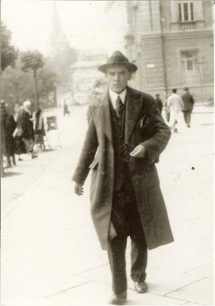As a federal employee watching Elon Musk wag a chainsaw to a jubilant crowd cheering the indiscriminate shredding of government and faceless “bureaucrats,” I clutched a photograph of a man with resolute eyes, a firm jawline, and chivalrous posture.
The man’s name was Franciszek Swiatek. He and his wife Genowefa, a Polish Catholic couple, had risked their lives to save the life of my mother, only two years old when Nazi Germany ruthlessly chain-sawed its way towards the destruction of every Jew it could reach.
From the beginning, ominous signs from DOGE and the Administration transported me from the flurry of Executive Orders to a legacy of inherited trauma. The approach, then and now, was calculated to diminish, demoralize, and ultimately dehumanize its targets, which extend far beyond “transforming” government and the federal workforce.
My inbox, littered with messages about the need to cut a “bloated, corrupt, unproductive, unaccountable bureaucracy” and that true productivity lied elsewhere, evoked the infamously cynical sign at Auschwitz declaring “Arbeit macht frei” (Work Sets You Free).
Measures instituted to “prove” one’s accountability via return-to-office mandates and answering “what I did last week” bullet points evoked the fate of Nazi-era Jews who attempted to prove their value or worth in an end game where neither ultimately mattered.
I was given notice of my “Reduction in Force” notice from FDA on April 1, 2025. The weight of that action affected me as it would anyone receiving a layoff notice, whether working in the public or private sector. I worry about paying the bills and caring for my family, including a son who is battling chronic illness. But the weights on my shoulders dig even deeper. They reach into concern and despair of a country, and world, that is ablaze in divisiveness, intolerance, and cruelty under the canopy of various ideological movements. Those who are vulnerable; and those with chronic or disabling health conditions through no fault of their own, are not spared.
History has shown that charismatic, self-anointed “visionaries” and demagogues will rise to power in every era and that they will soon abuse that power. There will be those who continue to rally behind those powerful forces, no matter how deeply their descent into chaos and destruction. And there will be those who stand idly by, as so many did during the Holocaust. But there will also be those who choose to not succumb— those who choose to resist.
Franciszek Swiatek, who along with Genovefa is honored in the Garden of the Righteous at the Yad Vashem Holocaust memorial and museum, was a man who resisted. He fought with Polish partisans to disrupt German transportation. And after the war was over, when my mother, whose parents did not survive, remained in their home, he fought daily with a knife-wielding landlord who had discovered that their adopted “Catholic” girl was, in fact, Jewish. He also resisted joining, at great sacrifice to his career, the Communist Party when Poland fell under the Soviet sphere of influence.
As a young boy, a friend of my mother’s remarked that I reminded of her of the iconic, haunting photo of a boy raising his hands as an SS officer aims his machine gun at him during the Warsaw Ghetto Uprising of 1943. “He seems to carry the weight of the world on his shoulders,” she said.
It’s not a weight that I asked for. It’s not a weight I am eager to bear. And yet, the moment has come to share some of that weigh with others.
If he were alive today, I have no doubt that Franciszek Swiatek would have fought to extinguish the destructive fires ranging around us. He would see through claims of “efficiency,” and “transformation” and he would promote empathy, kindness, and compassion, values to be cherished in any era.
# # #




